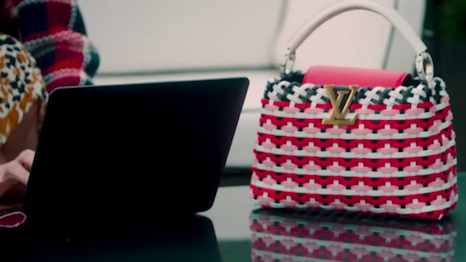Brands and retailers still fall short of consumers’ expectations for seamless omnichannel experiences, but luxury brands are among those that stand out from the pack.
According to a report from omnichannel platform NewStore, luxury brands achieved the highest overall omnichannel competence score with an average of 41 on a 100-point scale compared to premium and lifestyle retailers. Leaders in the space have embraced mobile as a way to fill gaps in the shopping journey.
“While we have seen great progress over last year, it’s not happening fast enough,” said Stephan Schambach, founder/CEO at NewStore, Boston. “The brands that really struggle are those that operate online and in-store in silos, on systems that were never built with other channels in mind.”
Newstore’s Omnichannel Leadership Report reviewed more than 200 luxury, premium and lifestyle retail brands. The brands were evaluated based on their in-store technology, Web sites, mobile properties and call centers.
Omnichannel journeys
High-end brands must place extra emphasis on in-store experiences, since affluent consumers value the opportunities for inspiration and product touch offered by bricks-and-mortar. However, online and mobile experiences – from discovery and purchase through fulfillment – cannot be overlooked.
In NewStore's report, fashion labels Moncler and Louis Vuitton were the highest ranking luxury brands for omnichannel experiences.
Moncler differentiates itself through its Genius project, which requires that retail associates use technology to track and access “deep inventory.” At both monobrand and department stores, Louis Vuitton empowers its associates with iPhones that can access a 360-degree view of each customer for a seamless omnichannel experience.
Burberry’s mobile application has helped the British fashion label become a leader in terms of discovery. App users can browse Burberry’s collections, locate the closest store – more than three-quarters of all retailers do not have store locators on their mobile apps – and use click-and-collect services.
At checkout, Michael Kors and Saint Laurent offer streamlined services online, in-store and even over the phone.
Within the same transaction, Michael Kors allows a shopper to ship items to different addresses or even pick up pieces in-store. Whether in-store or during a call center conversation, Saint Laurent service representatives are able to access customer profiles and make product recommendations for individual shoppers.
Consumer engagement is another area where luxury brands excel. Thom Browne, Tiffany & Co., Fendi and Ermenegildo Zegna all ranked in the top five, while sustainable direct-to-consumer label Everlane led the category.
Jeweler Tiffany & Co. is the leader in associate mobility, providing all frontline staff with tablets to assist customers and personalize the shopping experience. This enables personnel to search inventory, order items and complete transactions without having to leave a shopper during a crucial interaction.
Areas of improvement
While omnichannel leaders had an average score of 76, the retail industry average is 40 on a 100-point scale. According to the findings from Newstore, however, significant improvements have been made.
One of the largest improvement areas has been in terms of fulfillment, where 56 percent of retailers offer buy online, return in-store. This is a jump of 33 percent since 2018.
Frontline staff also have more access to consumer information than ever before. This is driven in part by the 68 percent of sales associates that now use smartphones or tablets to engage and transact with customers, an 8 percent jump from 2018.
Nearly six in 10 store associates can see omnichannel purchase history, up from 32 percent last year. More than half of associates can also now access organization-wide inventory levels from their mobile devices.
The very nature of customer service has changed in recent years, as consumers become more knowledgeable and discerning and personalized in-store experiences have become the expectation.
As the way in which consumers interact with sales associates is evolving, more relationship building is neccessary to maintain the relevance of the crucial frontline store staff.
Today, about nine in 10 consumers research online before heading to a store, rendering informational store associate conversations less effective or necessary. During a keynote at Luxury FirstLook 2019, the CEO of Shanker Inc. explained that to remain relevant, store associates need to undergo a cultural transformation that helps close the gap between them and their clientele (see story).
In particular, luxury brands attract consumers with rare and excellent products, but maintain loyalty and grow their client base through customer service. Technology has altered how sales associates engage with customers, but meaningful relationships that boost brand loyalty are still formed through human interactions, which can be developed and mastered with proper training (see story).
“The key to omnichannel is having a single system for real-time omni data – inventory, customers and orders,” Mr. Schambach said. “And more importantly, putting this in the hands of store associates.”
{"ct":"IgcY2+qEwbmvCm2ZrOpaTmz+KoW22lN+t7mlFt\/o8dR4+usLkrYNuE+fqz19GnnQkDCdebClDQflADgB3OKxSqEcl2w8tJV742eaoD8\/CaM5BXZ1hT8xVCPbUA6uy5GQzCqD5MXyhw37LaJ7OVjRA4jScgq7+XWisWQf7laQ86p8pHHt2QuLM68Cy4vbT6ghWE88\/W+\/DJGErVMmd5bM+V8kWs4CUFuOYjwnSs5tyRNzAilkcngi++l6ypmKVYMljSLXZifw92304Bl6ZsyPvPH28vMJsha17TAJb6hI2jxDGY6slpLLaisAF1mZSGl2S+p+AW44UCBmw\/x4kQoK619ngTt5RZiT7dczr8qpY9lStfdWSM\/kh\/wf3E1icxNb7aAEas2G4V1jHZsIYkI4VukNB0p+JFR2LkRAT2yjYrrXR\/o7GquTk5+OBVc4cxT06D8Td4fDpH5+HP2OxwG4MIF3cQpfS8wR37GMJgnQJOGIWIg7wa3HCKdEQasmw16L\/QpKcmkPgXHlJ82Tdm8pXeTZ8vt1QLa7uiYWntPpWMSrpYEPP8uQq82Vc63h5tsOwskNhG31Hfl0vyIlsuA9CUjrtAKFdOrLXuUW\/yriPjvsAy9C3mONM2evgwpEOrwNVFU0T2bnzz2NEQLSj\/FUwAzkLjKXYHpvNLphMuybhjQ4UmWn\/5yG7+4NByrOHsTrFUXKP\/eTGZ4ZXwD0Mam6klr4aK2e9gyH0wkYYibyXTQZ7N0iEl6AcNZFRnlXjvUJt7xGmj1xUZg0snxtDg0T0LG4EnmCMcwi+VOCd+eQju2FTeuhPMZFXt1yFjii\/JkHFo8lN2hj91OFLQf2G9zK0XdLmLFd7fP6FPbZpc6XhXy0vF0\/haFqxNGhYA+lCPlEg2xv4Y5OwBq44S1WAy9BrUuwAEfvaeann66VBunK+y9l4CLtjVT559bFHS9ez9WsLVT7YyDTK2s1T+oMl8ee0Zrp+j2CxDRRErKKJKFrHfIujUWDYyc+TTac\/VuxEI5vI4M00I6fzhCz6iBWgVfZn6pckoWML+4kx8b6PUFm976W1n468OGGrgY50zUCvjBMfijEdpSm1MgPuyai7jT3S+m3f\/ngW\/B1vb6+iZkRZZ4EB2ITpzukj1tViQW1WT8aytQqD9daTl92atOhTsRw\/jhuaRlQskCZ3X8NfPDVAdpTTJKLsGimIMLyPRsDPKYOOiEri1LynVeIv\/Odzi\/l4GJQykNoXEevzzRrsWiEaYTDSbl0ihLLi4g+1H2NqsMlaTQyWckUBp\/adWJ\/h+ldjjT\/J+1UtmK5OgyA+jD3Hkdmel7dmEe31lVjw7Dd6SqGEtrejfDJF97bYnT\/5vyHzfNhysI5N9LbYR0vWiVIWQxdw0cSWXnRF45NVzyCxMjVp1vAyCTKROtiRM1+3Yuf\/QY51LuJvGLobH1llaxs6pkCha7ojBf8rGOBbMg7EDItcR\/uGTkks7FQj8Mk9Y71fJZsHrnaRziaL5Q88rXQDXmqmBWOgXEgq3CdRHWpW58FXwMzKZsj8Ru\/Y4nKr2b4u35pw9VILpvqLg8HWtw8lTBVWmL2\/OGCLjgSeSuHqltyKWPw7NOb0yllFYNsdwej\/0EvcQjacRTOE0cRpOPYylDhd4b+w28DwfPBs8Rx4O50wV55QkzclN3J7feSnUVWGqLIJ4E5LOcV0tfhNN1KRCbUs8E6Q6Wpl5W9E2ASAodprePJdbaADhzvo5+i+lmFJ384pocdiPkodLr0rfWtM33PLlssNaFENUlz+LyeGI0XmmtLcMsK0OOJ8pX3rW\/t69M\/WK6F2tOVocSiKHlVTZqAYxr0WPI0fCYezx5eGa08LjSRsLjZr0HYK2\/tXxGsGVIz5d71Zn6Qmyy79+UddEAX\/7Tv1BkA45z12hh4lFgE46c4oGH6SnKYYka\/n+ssGyY\/77sv52HoTYdbwdm5FH2sqyUZhgXhc2CdDfRTNwpoXL3Vtgtf2CrU+mGnJhsuc6eA1Eg+8\/Imiw2\/3z63ZPWh71xiyAh4QhujQg4fWNxVLJ06XnER58om9wBE7iqXCjByqrEfTS6gFIzEqRYpQSteUYFKs6v9Sbxmcybw8lc+C80jpyyB\/JDeH+R3O6rB8q5DQ6wHUHgEY0H2t4iELxgyaCTHVwiuRJmAjta\/Lzd7YfrHpTtPthOzZueGWxep+S8Vn\/HubOgx2KSd7bgq81T0OCHAZzS0bpZSoRXm7XVvXwhypbe7zgcdWFpH+OcaWxkYDimFm8dO3Os9YROcokfqNlHCP4KIp8SROyTAx69as3mHpRlepmyJu97AhO80yz9J9cIc+L0XxYRJZYI\/BuYu6pyc9g8K9yMW6OPff2epVAYXzblbromHVccAq3AwF1uIneC0+P0bUGYTyah37ZORJfLwhEApoofgHr2tOEYRJYqQPkgLvhFgMs\/FA2Siwfc5X4ZcXtnX9aQS20gDxSNnBq7o9FCJfiPWKIY4isppHT0MoFgZ+AfT3jVLdryL3NQSh5BZYmfJYBFLDWD8UflZt51WfU3v6lbI1SpB9WgZ+gStzQuusm9ibbhwU6DCp58p+UKgfzJfWcSkuvuABIS8nNegW+7tW\/t9QgJWwSUewtEJCG\/EY5XsZ1ylpOy8Riyb17RK2\/dnNA1\/5Rf3nB9Zjz3Dr1TgbTqfqUcjqJjSRMr0jJQ2fjTXHtEwHc2\/lsRLxI3kVhchyzlq1fBTXI+Bu\/JG8SCJCeRxj99Wh8p+z0muQlBUkFKTzodWlkCOE5NkPGz9XN9oxN0SKPA9UfW+SRDTZU5Yi8mu9zVEYU3x7lqBk3O4O1aMOAzMM0Pxr2cdczGr3fwhUg3PTRextPOTSvx69vztXHwW3sJ9MujEMWfgDufiESJXb2u4wk2WV2vhSjUEGgfHUCtYqz8GoFUFYHeGmdsRWlD3dFmdtmWfqVx\/XKEQC0DcXBY84aCtWyXSSXltd7O44CvxX0v+NjcLbxDPPbmCzSn0mzIyfp0m+U\/1fnnQ5jZFvn\/F5ychqprqpgHWNs11Gbi1BiV\/mh4jfw96+uHgx9YCaM\/jWWX2PeN4scXmc93M32Osctw8fk\/KaGso0EympBScIjCk2i4eF93C6ll+EK9FQ9NXOXSh8nXcT38+dVl673HoDp\/nLyubIM6GTOV0KPkGOvW\/Q2oTirZl7d3PPAFZPMiDtmGJ6i8huJMjdOVtmZr3DRGOJer9Cx+MDrNKcl1VjYXvEXV6flunBYtA2j5NIlzCpTqobU0JtZsPuHIAnhP0FXtiJEuSt4vgNIniaySODB7D2KPbr3NifV9+ZB9gnBMrIqTL18HZI3d5URCwUcSUcYkfBoiAVU81V+Fx\/G+Wjb0U15SVttO9jzRfN2okWmmd+2YtRXe4CWHnY7v9a8\/UMC80DhSA+ml83ppUvdtNSeF5fPNJefmk+R+D+UgE042hrwg73zZTJ84OlfiL+efBj7wH+CeP9lTs9Q7xLVpNXtT1b+cbxQYY14jc0H65PQHCLl1Yhl\/z47kbzkSqs+nyXGePx+RBebWZ9kPcqqHetVkSIfPTW6OTr2fHbvpfQjy30gDLFGPV3uTd6+B\/BRcaWZjOslwdQWiLsBOHUfXMQLAYT7qPBxISf9p1rDh+DO8PKD9LWvzkdmFU2yiO+kwPbotKYZzF3Nzhx18+5aWOJ3BsOT20v2GjCXvklbBS1AXreMDjnxOqrwHF+tN+ErUlRQ6aEW\/d97Mh5ZgqWqbWnZMgQvcuLQ8JoJES\/RTgTHtxmatbTA8vWS+hcHzYsw5o9FULNi8eg+o0vQuzi9AtYKvHDzdHWBup8N2R9ncZvW9ESJtElT7WPSo49vhuBMw8mnY5xEnZtdkISh7U2T0to\/IsjaNWkLGeoMa4cWVWqaMFlAekWv+CzFdaAynnb90augpaeQZRBVZj47DtgUALWGOKF\/AeFIEJEf9kvieAnd8DtKieS3BEK4tutIprYoN4VAITzeq9WNlbFhDPDC98hRF2Zku5z17DL62DpU3XQuj4GemWxZpUj6F7LDOXDg1yJhZ+v02xAyrxOOXQ3zrNlGF0RR\/JOpVhY82TAV7lz3N3lt3y47ekVczgfpTQL\/ka5cnSeFPyXzHJXg8wf5f4hiv6G3aLcaU1ssR+6NEUZk\/7AAlQiDHF8QvM8L5bNeUbrbeqt1DbiOnE69oqUudgCDSSHpmzKcz8yg0z4CbbAEbR3jzthL2Cot6Q9qTtkq3kXcZQuckIN3+0e\/5khxVHfPJ3QLYEbq7x7Cam4fD6B7Ma5DWyZ35\/Y5pteDDuFee3yb+nGEuwfvjkOIhCtuXGxg3syqsz1tB+cAk2TSfauNC5KFIdc5tOhfo6WmZgPqawai0cxoaTVTknqrtzvYZzydCSrDjo4qJnawrrFmLtMbuLWIh\/H3f1vZ6Sj5mfLqbq4eNt1ULpZlSbC6HDtyol+ujDNExCb5tn+dzd+dvHv6Jbtt4wCaQhfk0Hm8Jtcy3HYC4Z4++DvSiOzYnhHcB9Hmtem5W9bAD5UnmGC8bBqkOXzrPtLjpcWoRACF0eeIZ5H8H5EJc1eiQvui3dpLKydDP8+wXF0c3lVtOU2i0ocxfUDHqJM0owlHZ\/pv2UHHhtP8RcGWjfZDLoNyCCZx97J0acnA8JS31VbsGfYXSm4KCQw4SIkFSigPY0m5vsPqsY5gfLFDqfvdpqT72nyB8w+vpdgTnoGD4n9ioXGSe1kL1WAE9IxKtDpaB6SNOYRIpATRFpgrrCrRVDCCxf5mpVXZNlsXmkNy\/e\/\/aZkk2tOd\/IXL4+UnT7Ietyo2frAn2\/6ElF4xldDzL7ObldS6w21yuUxzKLG6dE+Kj27m92FuEUviU9R4XRtyNIi1EN5WNAnRH\/BIcT\/5Gm0OlwCk37urqtc+AQMv2ayRBJlCJtbaMODgXF8BWO3PjvDMlsjR4h41XXzkiX1nbL1eVFo8EjcRLNJjlcEGbTpDa+4wizt9wDjlyKxoiTrNooV8LD8aeMLh32tTaThJ+ICp73HicWAUWX5cLLWXWPFmp21JPf5HUGwCqQri1AG5y6iuNIYZAThMRbsZ6d+DNI1d2uesHcTKElbCxOY0slf\/+bXEPNYD\/4jyDN7ZA6mGSL0cDZVdpN3qEweojRCclTDbk5aDAtqApKWZRjPRHTee2wMcZqY4I7Xccipx9QzffPU3NUoQdBmqaft4hNOV\/ALmIHvBxMXXLhXH\/ADBRgalrmXx\/erim11CDDTkmzwCvb03BEdBjcRQDQLWIXEf3zUVPKEDBLDd1d7R1M8Hu\/WY9d+cC7BIx3JIl+bUBS89VKEVmYXYUDlnwr2iumsQnSp8U5Q41pPTMG9A5GMcFhvykP+Zowf6f0DlR\/k1VpOqB5krWsHZ9KsKKoC2PPNiwBmaPoAtIg9DHc9YLKlzPipI7u3ZgQweZMbOxyvKR8zqczVPaz132q536XeE3GMajEYIhjI40N74IjqbdlYx2CCCq06tSI8y6CXdWINj8ykF9Zgh836mksMxr\/pSuArjqDiWBQhaQaieAI\/7O+UV0eA4cUoXCc4Mwb1pQjiZcBKMbMTOGGwkXkNCPZmHOvj6KnjsVG44JYR2vP94nXn2irOHRepz\/+e0iAwq2S4XMHZEPd0YQIdtg2f7XXjaK04QRGi0bx0QghYB8w319SjhjRlbKSfDXYZTE\/XyU89615jYqNZVIotBNpnvgoVSzojjlBq2tpyWASABp+2bNZ4egi2gQ5CrD8ysjNTEqfR4CyJ1\/s+e66nlMJv9iOweRIRtdg2xbmgiK+WZ7nyUh5G6Vl8Hgzix3En7eI6AzFtQyf61eOlKtm0QHykRaXrQansoXqghZ5AGGD8+NMedqXadA4oDlHUCX2HEw6e7TfqpvTwoPJy6x1MAR0Zj6LEHwZ4U92BbtPoqAglLv+CZp6RnkmFYgwYMHBft1NqWzkveUlCZEcjv2Oq2tgY8dVKw83gilcgL8QegMH73zNwvOXrVzJH2k9pbjo7rBhGIk1k2HPcFQ8niU17u1L8aSqgtcyJtFMXC+Qy7kp3nwx+RNKEk2VFLprBgP3kEsyeiQvn2SyhObPs6lp\/\/3wvmSxmTuY1sWNPLGA7+ZhpH5RiUdoKK7GsSZKwXy+lhooIEu5Vq0qph3b6ZL+ux3s1+Ls9331Nuv1\/l5UW5LZ1+f1qP17bdU+nJtgTHzUY9D8QL\/9xMYbYaD4w5stmVWJNgDEK3wtfEWr6HTkI0XAglkC7MRu6wlZ86D05Wse\/uFNbOIZzdtwAWSkPlg5urb\/XnCay\/oX2NFWCA1c4VVOU1vCA7Wb3pmBic2+L\/KrtldZIM\/mBatQ5c11QdTggLt5xPIoH3n1EzXlSH2Dk9jlrrC2n6401fWmpsMFLCQh1I4kH3eKxIPYfS6a6lzYFAFagxeynnq7MKFMnCvrdQHEeUZVWcCrlDFfbNfLg6s0WQBwbRZpgLjQ0s3q73BETpw\/ujUsXasdMMZNLTL8m+hslgx4dkxucZ4DFF4PglVqG7CK+BthepY44EH5+NZp2m66KTymrZck+9ZOxMpLh\/xv5cIipgOw7NFZwXPLohFlrmsgvcAoAxnU3l+y7\/VZsOS0uHV9dSgQ29pv+L+rPcXY9m7C\/8Iiq2QcQD\/58sZaLW4lnZa+ICrlmK7A+WiKb9vN5qqw9hEHzqOyz5aIi9xpd61mwkZqOM7TBZ2dSAnyHlHZ01YJCjKSFdE4HkGFpLLqvblJBO8pAToM4rH2VUCzph5fkRLkYBxwV1145orCoW0eG\/o5SL+CXDjYDhCPc0DQrmYaJU9jJgD18on3R9iGgXWkMwdsrVhEPfiax9DqnU4v8+5YELj2EkAweE5haIk8B08aX8qWCdEQOYMyRejvwy1fTbFaoG8NvWwJhZvjqCXfA1\/T6SBJt+wU829NMbXnmkoQJhfjBBeoz6XinceMPatzsq3NjniGHe+cmxZDkHTBB4apOnj+Zi\/EwBGEf\/SGTq8CgHpAnSkHI3qcL9TdyqDv9NakYKdfHRpAOnufFoOUCbV3GF6H4CNo5C9DQTtdTDWt2W2nkEWebCz8TYdIce7qwEa9JEoCFmYw2qHWYjduM3OycSwrYXoD\/XSBnkVPYKCnW3THgzoMDqK\/85Gq\/hjAFEuJG5F1Nx2IHuWusD66MhM1H8+Izv6vWhSzDaYhr+mKO7O6U7Dh3ERjTQO4PinosM6e430UEwAgsIOyjVJCu36AG1aMzB4gtzJz2AKg9AOCoB2S0fM7Xz8hsJh+wi8IBVRG4btxZ0bdgcnoF7uIbknESOMeXKsDmftARccK\/sKV8v6hpUbxro+GLS08cX8IowQccJFArKugjT9YdzP3DTfAsTEd+yLjaEi8pX+3tGx2GHk+f2O8DAR5HdwU5eQUJ4lRYOWJAabDzMLpl0O70RLjZfIyNPu7oLG41F4Lf\/40yfHC+niBV4wWZT+gNmTVMfV6zMrW\/DvovobOajxDpwsHc+gCQd3p40ypyoQbz5PEl5tLgac5IF9STSY4+q79z5ajNMIpUKfyCBCkVANYfolkf7ssBiU0\/\/ptR3n2GildAwPIz2Wid8DUFc7I1477I4lFOqZR1BzLSbRUowKBqo5m8qRLbZm4Jd8r8KAPX5ZFtDxy2uFplHWP9HXMTYx2bnMUbBlX4pn4Speyg+OTXU4YbpSG1YN+SGxCLS9BxGDjxr7wnpOhiygEQxpFcUI\/su5d\/ZMdKrWtoEh8+ETmllXe0b6JiKTRWcnNsWBWaKbyj63JgYIf7HMYUVqtw\/ybLx\/YoQUF2pD+my1QOZ9NWrdCetlwukB4Jd5gXEhnuidn4ex7mfkftYzEq7xXsAfs83g6wTjruCCFdYLgKu\/vBuS3t5aORzI+5T0AkrLvR+RrFnBLRfuwHlYsWaFGYhTDfJ4dgrw0ezuDtRZGi39oKv03Dqwx1Uj1Pq4Pr2x93zbxLPQHKcOXiiNT\/MQORIb9JNE=","iv":"ab554ce0f6cee1d60533df80fda519f7","s":"76d97afcb6fb2403"}

 Louis Vuitton’s in-store services are catching up to its ecommerce experience. Image credit: Louis Vuitton
Louis Vuitton’s in-store services are catching up to its ecommerce experience. Image credit: Louis Vuitton